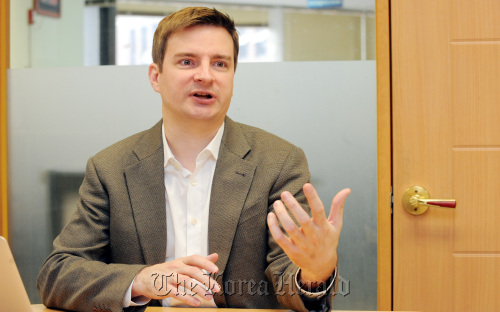Seoul Honorary Citizen David Linton argues need to remove legal barriers for start-ups in Korea
Since he started working here as a lawyer in 2007, David Jonathan Linton has focused not only on building his own career but also on how he can use his legal expertise to contribute to the advancement of this country.
With fluent Korean skills and a deep understanding of Korean culture, Linton has an affection toward the country that is unique. He also has a sense of responsibility and personal desire to keep up his family’s century-old tradition of contributing to Korea.
The 39-year-old lawyer has recently been named a Seoul honorary citizen by the municipality in recognition of his efforts for the country on top of those of his family which has received gratitude and praise from religious, educational and medical circles here.

He is well known as a model who appeared in public advertisements on television and at subways stations to promote the Group of 20 summit meeting in Seoul last year.
“One way that I can continue the family tradition of contribution is to contribute in some way using the knowledge and skills that I have, which is more in the legal area and business area, especially where there is a connection between the law and business,” Linton told The Korea Herald.
“My family has a tradition of some kind of contribution or service based on Christian ideals and motivations. But it has taken a different form from generation to generation.”
His great-great grandfather Eugene Bell came here in 1895 as a Christian missionary, initiating the Linton Family’s tradition of helping Koreans in need.
His great grandfather is William Linton, the founder of Daejeon University, now Hannam University, who carried out Christian missionary and medical projects for nearly five decades. William Linton also received posthumously in 2010 the national Independence Hero Award from President Lee Myung-bak for supporting Korean independence during the Japanese occupation.
One of his uncles is John Linton, director of the International Health Care Center at Yonsei University’s Severance Hospital. Another is Dr. Stephen Linton, founder of the Eugene Bell Foundation which has been aiding North Korean tuberculosis patients since 1995.
Working at a major law firm in Seoul with his specialty in foreign investment and merger-and-acquisition deals, David Linton is confident that his understanding of the legal and business environments in the U.S. and Korea will help fulfill his own share of family contributions here.
Noting that there are some legal barriers and limitations that hamper Korea’s efforts to get to the next level of development, he expressed his willingness to offer suggestions based on a comparison between the two countries’ legal systems.
“To get to the next level of development, there needs to be more creativity and entrepreneurialism, more risk-taking. There are some legal barriers to the kind of Silicon Valley-type culture, which Korea could benefit by emulating more,” he said.
One example of the legal obstacles was the challenges facing start-up companies, which have had less flexibility in structuring ownership in Korea.
“For example, in the U.S. it is possible to have something called ‘no-par-value stock,’ which among other things means you can receive shares in a start-up company without paying for them in proportion to your ownership. But in Korea, the rule has been that you must always pay some designated amount for each share of stock,” he said.
“So, in the U.S. if you have a good idea and if you work hard, then you could attract investors and negotiate your share of ownership. That flexibility is one reason Mark Zuckerberg, the Facebook founder, did not put in a lot of his own money compared to other early investors but still could keep a major ownership share, whereas in Korea, so far an entrepreneur has generally had to have not only a good idea and hard work but also enough of his own money to obtain a larger ownership share.”
Touching on the changing legal market facing increasing global competition, he painted a positive outlook for Korea.
“Some observers think the Korean legal market should be opened as slowly as possible to limit the harm from foreign competition. I respectfully disagree,” he said.
“I personally think that Korean lawyers are highly intelligent and capable, and like other industries such as automotive, semiconductors, and mobile phones, I expect the Korean legal industry will rise to the challenge and compete even more effectively when facing a more open market.”
His fluent Korean language skills have drawn public attention. They were honed while he studied at Seoul National University from 1992-93. While studying, he shared a small room with his Korean friends, aiming to learn their culture as well as the language firsthand.
David Linton graduated from Columbia University in 1995 and from the law school at George Mason University in 2003. He also worked as a special advisor for the Korean embassy in Washington D.C. and in the communication consulting business for some time.
By Song Sang-ho
(sshluck@heraldcorp.com)









![[Weekender] Korean psyche untangled: Musok](http://res.heraldm.com/phpwas/restmb_idxmake.php?idx=644&simg=/content/image/2024/05/02/20240502050841_0.jpg&u=)







![[Eye Interview] 'If you live to 100, you might as well be happy,' says 88-year-old bestselling essayist](http://res.heraldm.com/phpwas/restmb_idxmake.php?idx=652&simg=/content/image/2024/05/03/20240503050674_0.jpg&u=)
